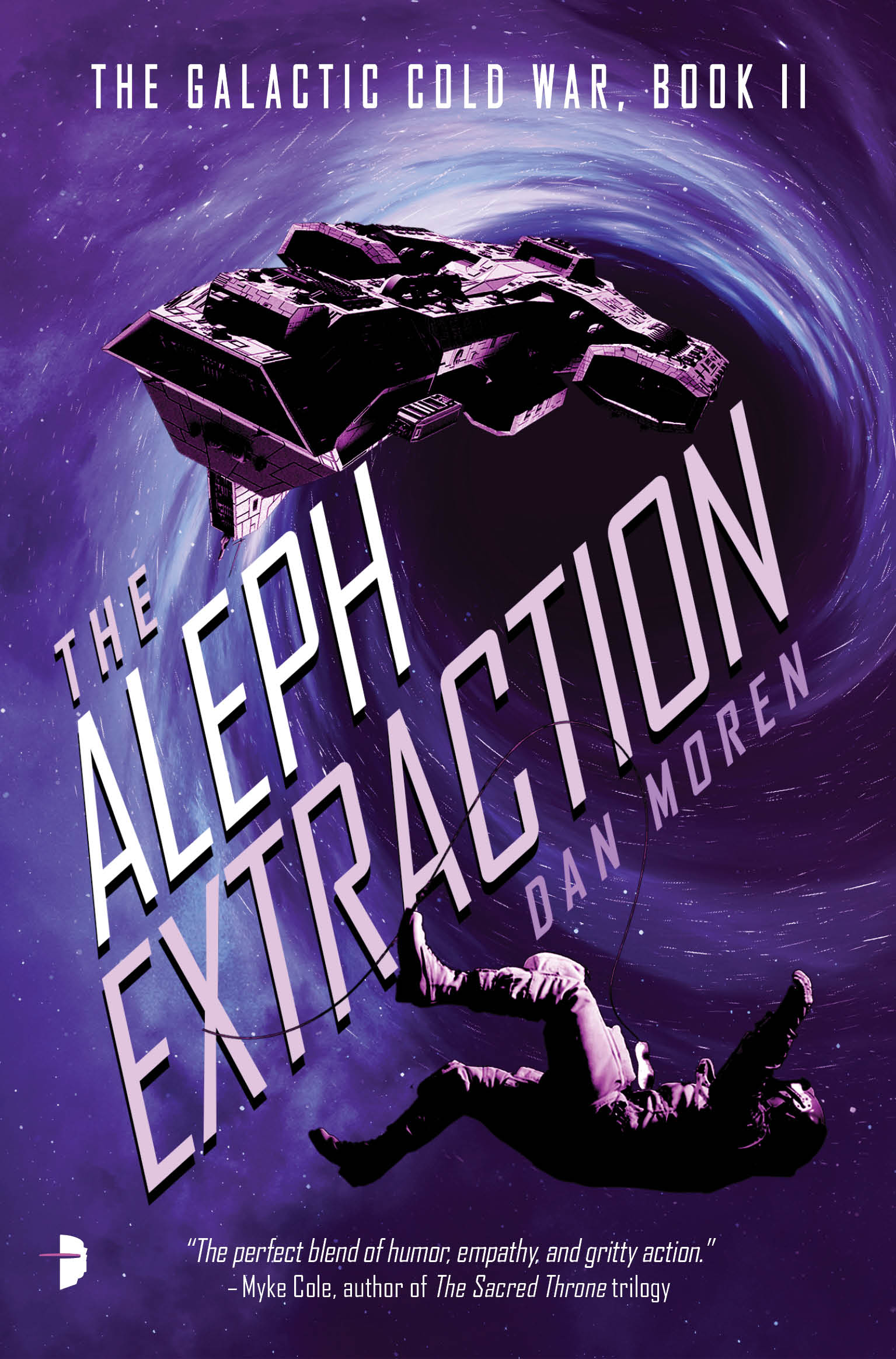 Dan Moren is joining us today to talk about his novel The Aleph Extraction. Here’s the publisher’s description:
Dan Moren is joining us today to talk about his novel The Aleph Extraction. Here’s the publisher’s description:
Aboard a notorious criminal syndicate’s luxurious starliner, Commonwealth operative Simon Kovalic and his crew race to steal a mysterious artifact that could shift the balance of war…
Still reeling from a former teammate’s betrayal, Commonwealth operative Simon Kovalic and his band of misfit spies have no time to catch their breath before being sent on another impossible mission: to pull off the daring heist of a quasi-mythical alien artifact, right out from under the nose of the galaxy’s most ruthless crime lord.
But their cold war rivals, the Illyrican Empire, want the artifact for themselves. And Kovalic’s newest recruit, Specialist Addy Sayers, is a volatile ex-con with a mean hair-trigger who might put the whole mission at risk. Can Kovalic hold it all together, or will the team tear themselves apart before they can finish the job?
What’s Dan’s favorite bit?


DAN MOREN
Ask any of my friends what crime I would commit if I thought I could get away with it, and to a one they would give you the same answer: a heist.
I love heists of all shapes and sizes: from the small, low-tech robbery of a Logan Lucky to the huge Mission: Impossible-style caper with masks, gadgets, and split-second escapes. So, it was only a matter of time before I wrote a story that prominently featured an elaborate heist as a centerpiece. Thus, my latest novel, The Aleph Extraction.
In Aleph, the heist in question involves our heroes, Simon Kovalic and his team of covert operatives, stealing a legendary artifact said to contain secrets which could alter the balance of the galaxy’s ongoing cold war. The problem—or, perhaps, chief among many problems—is that the artifact is somewhere on a spacefaring cruiseliner run by a ruthless crime lord. Oh, and their rival superpower, the Illyrican Empire, wants the artifact for itself, and will do anything to get it. No pressure.
The reason I love this heist so much is that it features one of my very favorite things, in fiction or the real world: a competent team of professionals who are each working to do their part of the job. That meant I got to relate events from a variety of different characters’ perspectives, each of whom—like the reader themselves—can only see one small part of the overarching plan.
But I also love the heist because the act of writing it was a bear. It turns out carrying out a heist actually has a lot in common with writing: they both have a lot of moving pieces, they’re meticulously planned, and ultimately something always goes wrong—but, of course that was part of the plan all along! Or was it?
Writing a heist means a lot of balls to juggle: Which character is where, at what time, and how much do they know at this point about what’s going on elsewhere? That’s true in any story, but it’s even more so in the case of heist, which requires a higher degree of precision that may be down to the very second. You have to balance unfolding events in a logical fashion while still maintaining elements of surprise for the reader.
Challenges are what help us keep improving, and putting together this heist meant leveling up as a writer. I tried a number of different ways to organize events, including spreadsheets and timeline apps, none of which really worked for me. Ultimately, I determined it made the most sense if the characters themselves had a “mission clock,” which let me set different goal markers—i.e. by this time, this event should be happening to one of the characters—and thus line up what was going on in different places. When I was editing, I made sure to highlight and note every place in the manuscript that a reference to time appeared, just to make sure everything lined up.
And, of course, as much joy as there is in everything going smoothly, one of the things that I realized while sketching out the idea of the heist was that things had to go wrong. While there is tension in watching to see if our heroes can pull it off, no plan survives contact with the enemy—and sometimes with your allies too. So every time I asked myself what should happen next, the answer was always the same: how can I make this harder for our protagonists? Sure, it’s cruel, but I do it all for you, reader.
What’s fun—and alternately terrifying—about constantly raising those stakes is that when the characters need to figure out how to get out of a particularly tricky jam, I need to figure it out first. It’s writing by the seat of your pants, and while sometimes it works, you can all too often write yourself into a corner, as I very nearly did more than once.
But, when it’s finally done and you’ve put it through the wringer, ironing out each and every little detail, you can step back, admire what you’ve constructed, light a cigar, and utter that time-honored phrase: “I love it when a plan comes toge—oh crap, did I remember to explain that?”
LINKS:
The Aleph Extraction Universal Book Link
BIO:
DAN MOREN is the author of sci-fi espionage capers The Aleph Extraction and The Bayern Agenda, both from Angry Robot Books, as well as The Caledonian Gambit from Talos Press. A prolific podcaster and freelance tech journalist, he writes for a number of sites including Macworld and Six Colors, and hosts shows on The Incomparable and Relay FM networks. He lives in Somerville, Massachusetts with his wife, where he is never far from a set of polyhedral dice.
